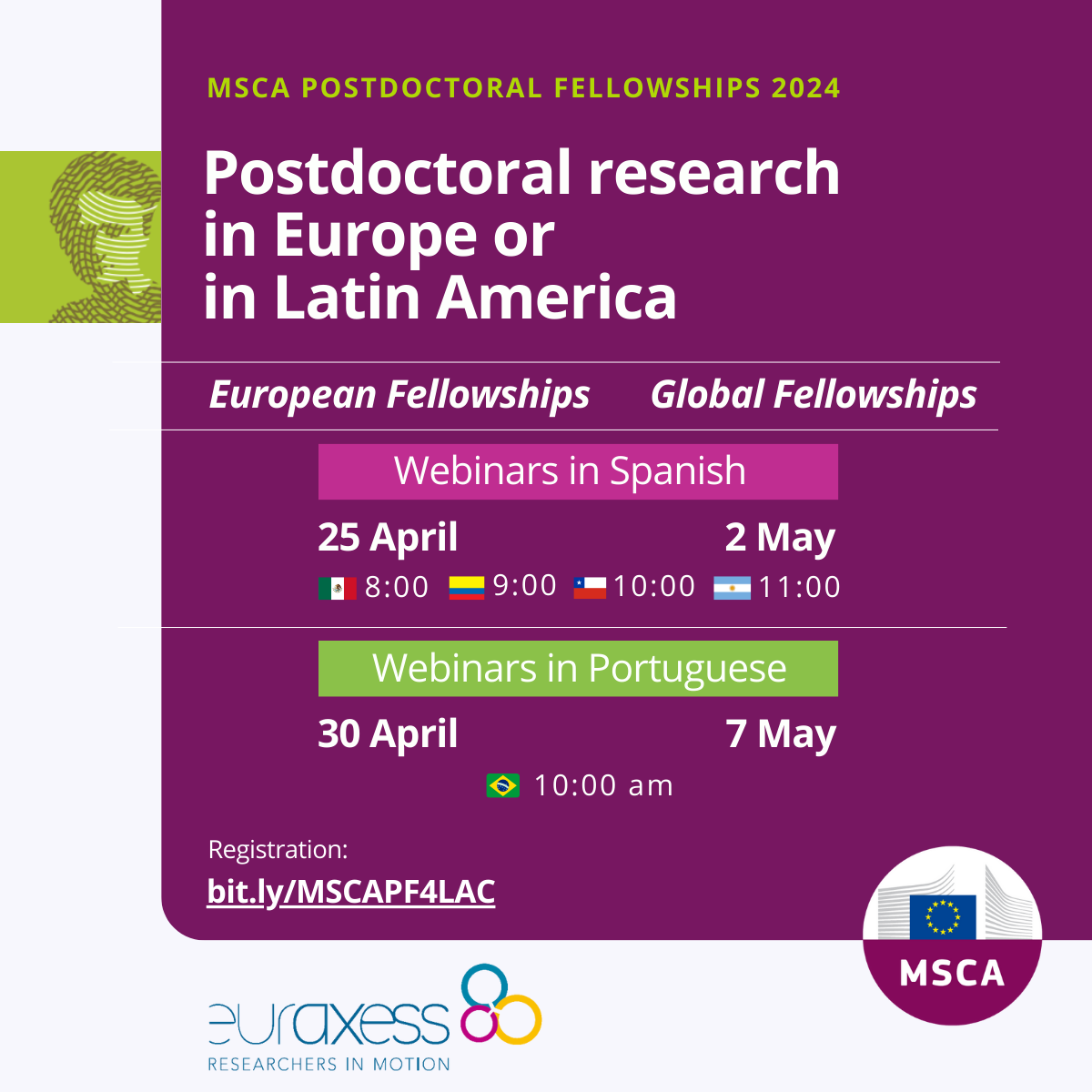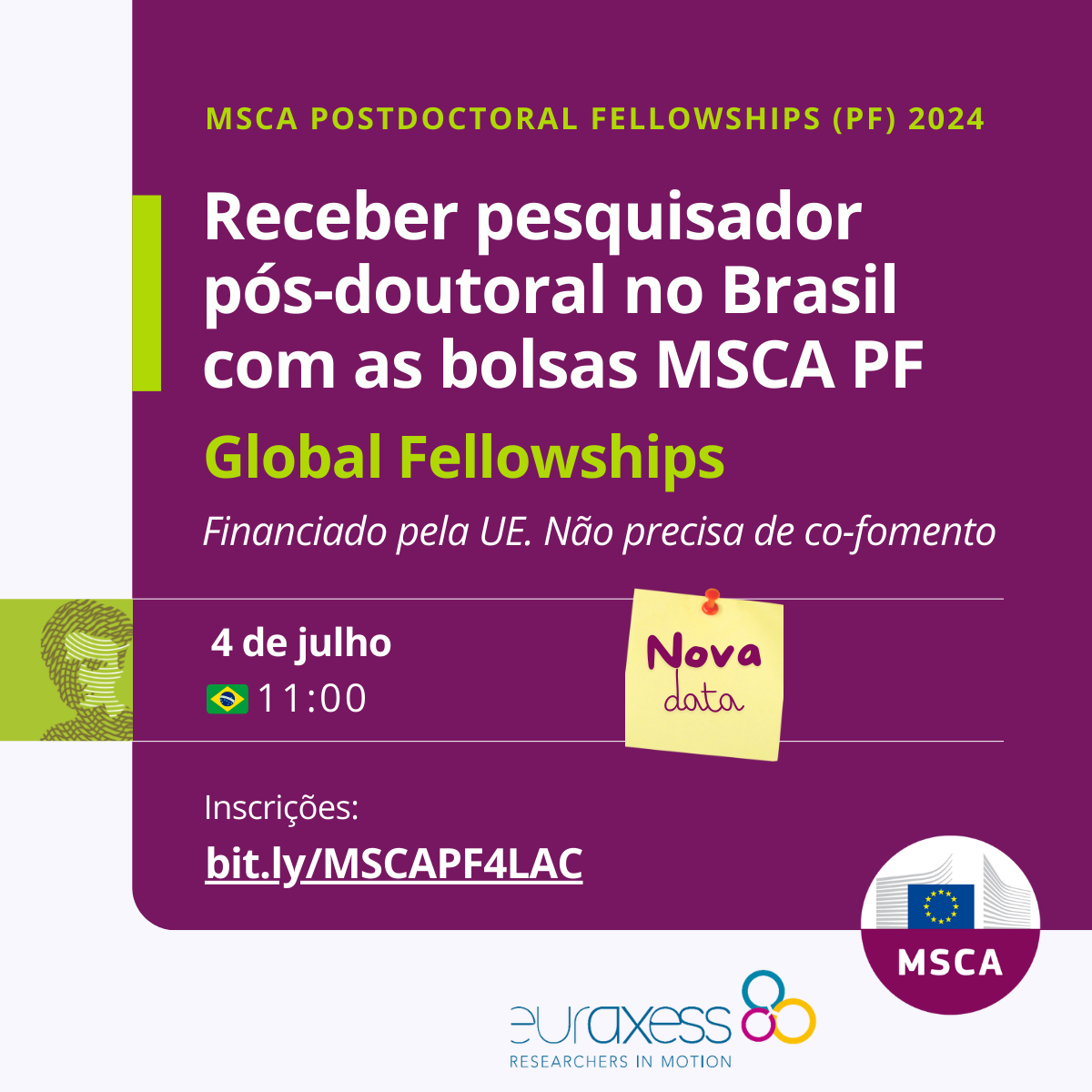
The 2024 call is closed. The next call should open on 8 May 2025, with an expected deadline in 10 September 2025.
The Marie Sklodowska-Curie Actions (MSCA) contribute to excellent research, boosting jobs, growth and investment by equipping researchers with the new knowledge, skills and international and intersectoral exposure to fill the top positions of tomorrow and solve current and future societal challenges.
MSCA Postdoctoral fellowships PF aims at supporting the international mobility of researchers within (European Fellowships) and beyond Europe (Global Fellowships). Postdoctoral Fellowships (PF) are for experienced researchers to undertake their own research project at a host organisation in another country, thus gaining new skills through advanced training and possibly, intersectoral mobility. The grant usually covers two years' salary, a mobility allowance, research costs and overheads for the host institution. Family and special needs allowances are also available, when applicable.
Two modalities: European Fellowships and Global Fellowships
There are two types of MSCA Postdoctoral Fellowships:
European fellowships
Researchers based in Argentina, Brazil, Chile, Colombia, Mexico or any other Latin American and Caribbean country willing to move to Europe for their fellowship can apply for a European fellowship. The research projects are carried out in the EU or associated countries (to Horizon Europe) and last for one to two years. There are no more panels in the Postdoctoral Fellowship call (Horizon Europe novelty).
Individual researchers based in Europe can also apply for a European fellowship for mobility within the EU or associated countries.
Global fellowships
Researchers based in Europe can apply for a Global fellowship to carry out research of up to 2 years in a third country - such as Brazil, Argentina, Chile, Colombia, Mexico or any other LAC country - and return to Europe for 1 year. This is an excellent opportunity for LAC higher education institutions/research institutes/private sector firms to host a high-level Europe-based researcher, fully funded by the European Commission.
Both types of Fellowship can also include a secondment period of up to 1/3 of the standard fellowship duration in another organisation worldwide. (Horizon Europe novelty).
An optional additional placement of up to 6 months in a non-academic host in Europe (member states or countries associated to Horizon Europe) is now possible at the end of the fellowship (Horizon Europe novelty).
All research areas can be funded, from physics to linguistics, and from health sciences to mathematical modelling.
WHO?
Experienced researchers of any nationality, i.e. researchers holding a doctoral degree with no more than 8 years of experience after the completion of their PhD (Horizon Europe novelty).
| 8 years experience in research All applicants that have received their PhD after 11/09/2016 are automatically eligible to apply in 2024 provided the remaining eligibility criteria are met. The rule of the 8 years full-time equivalent experience in research after the PhD can be extended (in days) for a series of exceptions such as maternity/paternity leaves, career break, compulsory national service, long term sick leave, time spent not working in research and, for European researchers or long-term residents that want to go back to Europe with a European fellowship, time spent doing research in a non-associated third country such as LAC. Check the Guidelines and tool for the calculation of 8-years research experience in Postdoctoral Fellowships under Horizon Europe. Links below. |
Mobility rule: The researcher must not have resided or carried out his/her main activity (work, studies, etc.) in the host organisation's country for more than twelve months in the three years immediately prior to the call deadline. Make sure you check all specific requirements in the guide for applicants.
HOW?
Individual researchers submit proposals for funding written in liaison with their planned host organisation in Europe. Proposals are judged on their research quality, the researcher's future career prospects, and the support offered by the host organisation.
Resubmissions: please note that proposals involving the same recruiting organisation (and for Global Postdoctoral Fellowships also the associated partner hosting the outgoing phase) and individual researcher submitted to the previous call of MSCA Postdoctoral Fellowships under Horizon Europe and having received a score of less than 70% must not be resubmitted the following year. (2022 novelty).
Call HORIZON-MSCA-2025-PF-01-01
(2024 closed call for reference)
Interested in applying?
The first step is to read the work plan and guide for applicants (find the links below).
You can also check a step by step made by the EURAXESS Worldwide team on how to submit a proposal.
Haven't found a host yet? Check out our tips and hosting database with many offers from hosts in Europe!
MSCA PF - Find a host organisation in Europe
Attend the upcoming events about the MSCA PF!
Webinar in Spanish and Portuguese about the MSCA-PF European and Global fellowships.
The presentations and the recordings can be found HERE.


Past Webinars, informative videos and interviews about MSCA PF:Informative videos produced by EURAXESS LAC about the MSCA PF (In Portuguese) Eligibility criteria / Financial conditions / The host's role in the MSCA PF / Visiting Postdocs in Brazil / How to find a Host / Interviews with the Global Fellow Sebastien Antoine, European Fellow Ana de Almeida Kunlien, MSCA-PF host Nicolas Maillard FAQ MSCA PF (In Portuguese) Find a Host webinar sessions with host institutions from 20 European countries. Event held on 5 and 6 June 2023. Check all presentations and recording here. Two webinars were held in May 2023 in Spanish, about the MSCA Postdoctoral Fellowships with practical advice, tips, and hints by an MSCA national contact point and current MSCA fellows from the region. Each webinar focused on one modality: from LAC to Europe (European Fellowship) and from Europe to LAC (Global Fellowship). As a result of the Q&A event in Portuguese, we produced a dedicated FAQ page based on the real questions from the attendees. Other past events:
|
Additional resources
Marie Sklodowska Curie Actions - Work Programme 2023-2025 New 2024
MSCA PF Guide for applicants 2024 New 2024
Guidelines on the calculation of 8-years research experience in Postdoctoral Fellowships under Horizon Europe New 2024 & MSCA-PF Self-assessment tool for the calculation of the 8-years research experience New 2024
MSCA PF Application form / Project proposal (template) New 2024 and specific keywords
MSCA PF Handbook by MSCA NET New 2024
Common mistakes in MSCA-PF proposal submission, by the European Research Executive Agency.
MSCA specific evaluation forms used by the expert evaluators (this is for the evaluators, not the applicants, but it is useful to understand the evaluation process) New
MSCA4Ukraine New
Find a Host Organisation in Europe & MSCA Matchmaking platform
How to look for EU funded projects, including successful approved MSCA IF/PF projects?
Marie Curie Alumni Association: Andean-Caribbean Chapter, Argentina Chapter, Brazil Chapter, Chile chapter, and Mexico Chapter
Step by step on how to submit a proposal (also useful for MSCA PF)
Contacts:
MSCA National contact point (NCP) in Brazil: Ms. Elisa Natola, CONFAP, elisa.confap@gmail.com
MSCA National contact points (NCPs) in other LAC countries and in Europe: http://bit.ly/HorizonEurope_NCP New
MSCA Frequently Asked Questions (FAQ): https://mariesklodowskacurieactions.blogspot.com/ New

LAC researchers interested in going to Europe (European Fellowships): You can check many interviews we have done with MSCA fellows from LAC here: bit.ly/LACandMSCA, for example Luz Maria from Colombia, Hernán from Mexico or Luis Felipe from Brazil.
LAC research institutes or universities interested in receiving European based researchers (Global Fellowships): Please read our interview with George Brown, Brazilian researcher from the Brazilian Agricultural Research Corporation (Embrapa) Forestry who received a European MSCA Global Fellow in his lab for two years, as well as our interview with Daniele Salerno, Italian MSCA researcher in Argentina.
Did you know?
Research organisations (public or private, academic or not) in LAC can host Marie Skłodowska-Curie Global fellows at their own institute. They are encouraged to express their interest by posting a hosting offer on the EURAXESS portal. Check how in our tutorial at https://bit.ly/HowtoPostHostingOffers
FAQ
I want to go to Europe with an MSCA PF European Fellowship. How do I find a host?
Search the EURAXESS Database of Hosting Offers.
- Use the MSCA matchmaking platform here.
- Be proactive! Contact your network of European collaborators, and ask for assistance from your supervisor, research colleagues or International Relations Office.
I want to host a researcher with an MSCA PF Global Fellowship at my institution in Latin America and the Caribbean. How do I find a fellow?
- Post your hosting offers on the EURAXESS portal. Follow this step-by-step guide.
- Use the MSCA matchmaking platform here.
- Do inform your research network and colleagues based in Europe of your institution’s hosting offer.
